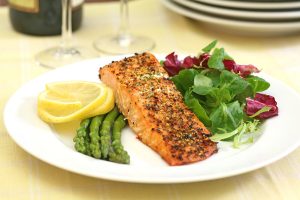A Danish study has shown that replacing part of red meat with fish shows health benefits.
The research was done by a PhD student and pointed out that men above the age of 50 were particularly benefitting from fish substituting part of red meat in their diet. Women in the childbearing age also benefitted greatly. On this diet pregnant women as well as the unborn children become healthier.
Risk versus benefit analysis
Sofie Theresa Thomsen, the PhD student who conducted this study did risk-benefit assessments regarding partial substitution of beef with low-mercury fish. Red and processed meat contains saturated fat, which is added to the other saturated fat in the Danish diet. Red meat and processed meats have been associated with colorectal cancer and some other cancers. But red meat also contains beneficial iron. In contrast, fish contains a lot of omega-3 fatty acids that are anti-inflammatory and also contains vitamin D. But one has to be careful about methylmercury content in fish. I reviewed fish, mercury contamination and the benefits in this link.
In her calculations Sofie Theresa Thomsen replaced 350 grams of beef per week with 350 grams of low-mercury fish per week.
If all the Danish households would do this partial beef/fish exchange, the Danes would gain 7,000 healthy years of life annually. This includes, among other health conditions, the prevention of 170 deaths from coronary heart disease.
What kind of fish can you eat?
As the link above shows, there are low, medium and high methylmercury contaminated fish. The higher the fish is in the predator chain, the higher the methylmercury content. This is of particular concern for pregnant women as mercury is toxic for the fetal brain tissue. But they consume low mercury fish and shellfish, like mackerel, herring, wild salmon, shrimps or clams, pregnant women benefit greatly from the beef/fish exchange. Tuna is too high in methylmercury to be included in the beef/fish exchange. If you were to include tuna in this, you would experience a health loss.
Vitamin D and iron
The study showed further that a partial exchange of beef by fish would reduce the number of Danes who are vitamin D deficient. The 350 grams of fish per week are sufficient to significantly raise the vitamin D blood level. Conversely, replacing a part of the beef intake with fish does not cause iron deficiency problems.
Who benefits most from replacing part of red meat by fish?
Sofie Theresa Thomsen asked who would benefit most from such a beef/fish exchange diet.
On the one hand it is the older than 50 year male population who is at a significant risk of developing heart attacks. The fatty fish with omega-3 fatty acids reverses some of the plaque in the arteries and keeps coronary arteries open. This prevents heart attacks and strokes.
On the other hand pregnant women and their children benefit greatly from the beef/fish exchange diet. The women will feel more energy and their offspring will have healthy brains.
Conclusion
A study from Denmark analyzed what happens when a person exchanges 350 grams of beef with low mercury fish or shellfish per week. The conclusion was that Danes would gain 7,000 healthy years of life annually. Among these is the prevention of 170 deaths from coronary heart disease. But the most lives saved would be among men older than 50 years due to heart attack and stroke prevention. Pregnant women are also benefitting tremendously, not only for themselves, but for their children. The fish needs to be low mercury fish, as mentioned above, as mercury is a central nervous system toxin. Tuna is too high in mercury.
I have cut out red meat and meat products from my diet since 2015, when the WHO came out with the statement that red meat causes colorectal cancer. As a result I eat a lot more low mercury seafood and shellfish.






